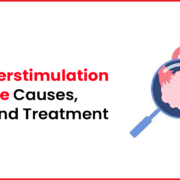PCOS – Causes, Symptoms and Treatment
What is Polycystic Ovarian Syndrome (PCOS)
Polycystic Ovarian Syndrome (PCOS) is a heterogeneous, multisystem endocrinopathy in women of reproductive age. PCOS symptoms may begin shortly after puberty but can also develop during teen years and early adulthood. It is defined and diagnosed by a combination of signs and symptoms of androgen excess, ovarian dysfunction and polycystic ovarian morphology or ultrasound. The symptoms involve chronic anovulation or ovulatory dysfunction resulting in infertility. In clinical practice, 75% of women with PCOS have anovulatory infertility and 50% experience recurrent pregnancy loss. A diagnosis of PCOS incurs a higher risk of infertility, cardiovascular disease, type 2 diabetes and gynaecological malignancies. There is a multitude of treatments for each sequel of Pcos, ranging from lifestyle modification to In-Vitro fertilization (IVF).
Pathogenesis involves environmental, dietary and hereditary factors. Efficient management of Pcos provides a window of opportunity towards the risk of associated complications. Treatment is broadly aimed at managing the effects of hypoandrogenism, irregular menstruation and infertility. In India, its prevalence is between 8.2% to 22.5%.
Causes of Polycystic Ovarian Syndrome PCOS:-
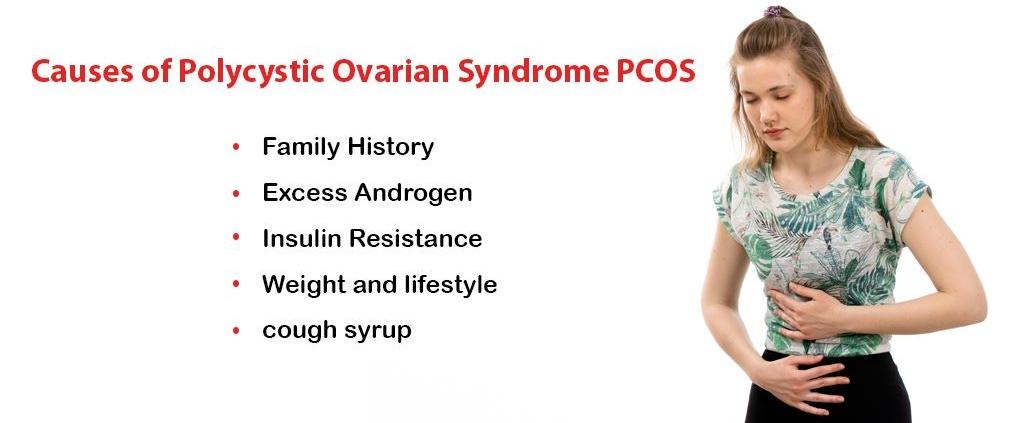
- Family History:- Research suggests that certain genes might be linked to PCOS. Having a family history may play a role in developing this condition.
- Excess androgen:- With PCOS, ovaries may produce high – levels of androgen. Having too much androgen interferes with ovulation. It means that eggs do not develop regularly and aren’t released from the follicles where they develop. Excess androgen also can result in hirsutism and acne.
- Insulin Resistance:- An increase in Insulin levels causes ovaries to make and release male hormones (Androgen), which suppresses ovulation and contributes to other symptoms of PCOS.
- Weight and lifestyle:- Pcos can occur in both slender and overweight women. However, women with PCOS are at a greater risk of being overweight or obese. Being above a healthy weight woman worsens insulin resistance, which is thought to be a key part of the development of PCOS. The good news is that a healthy lifestyle of nutritious food and physical activity can help to treat PCOS and improve symptoms.
- Environmental:- Environmental factors, including stress, play an important role in the pathogenesis of PCOS.
Symptoms of Polycystic Ovarian Syndrome PCOS:-
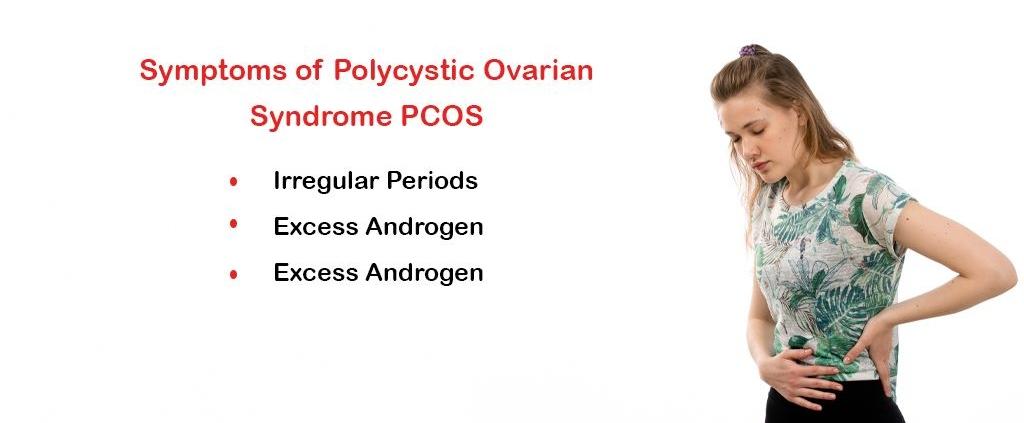
- Irregular Periods: Pcos results in irregular cycles as a result of ovulation. It may include Amenorrhea (abnormal absence of periods), oligomenorrhea (decreased flow of periods) or menorrhagia (excessive periods).
- Excess Androgen: It causes symptoms like hair growth on the face, acne, weight gain, darkening of the skin, and thinning of hair on the head.
- Infertility: Difficulty in conceiving due to ovulation. PCOS is a leading cause of female infertility. However, not every woman with PCOS is the same. Although some may need assistance with fertility treatment, others can conceive naturally.
Treatment for Polycystic Ovarian Syndrome PCOS:-
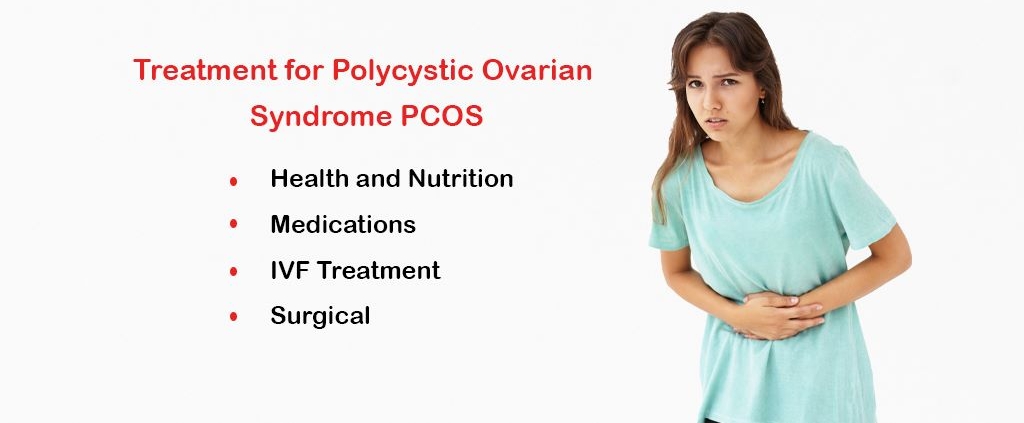
Most symptoms of PCOS are a result of hormonal imbalances. The treatment of PCOS includes a multidisciplinary approach:-
Health and Nutrition:-
It is the first line of treatment. We must meet a nutrition counsellor who will work with you to ensure that your diet and lifestyle are healthy and balanced. Weight loss can lower insulin and androgen levels, resolve ovulation, and reverse the symptoms of PCOS. The carbohydrates are to be limited. Choose complex carbohydrates, which raise your blood sugar levels slowly. Complex carbohydrates are found in fruits, vegetables, whole grains and cooked dry beans and peas.
Exercise plays an important role. Increasing daily activity and regular exercise may treat or even prevent insulin resistance.
Medications:-
- To regulate your periods:
- Oral Contraceptive Pills: Pills that contain estrogen and progesterone decrease (combined) androgen production and regulate estrogen. Regulating hormones can lower the risk of endometrial carcinoma.
To help ovulation so that you can become pregnant:
- Clomiphene: This oral anti-estrogen medication is taken during 1st part of the menstrual cycle.
- Letrozole: It helps to stimulate ovaries and help in ovulation induction.
- Metformin: It helps to improve insulin resistance and lower insulin levels. It also plays an important role in ovulation.
IVF Treatment:-
If you have PCOS and medication does not help you to get pregnant, you may be offered In – Vitro fertilization (IVF). It involves eggs being collected from the ovaries and fertilized outside the womb. The fertilized eggs are then placed in the womb. IVF treatment increases the chances of having twins or triplets if you have PCOS.
Surgical:-
A minor surgical procedure called laparoscopic ovarian (LOD) may be a treatment option for fertility problems associated with PCOS who do not respond to medications.
The ovaries will be surgically treated using heat or laser to destroy the tissue-producing androgens. Laparoscopic ovarian drilling has been found to lower levels of testosterone and LH and increase FSH. It corrects the hormone imbalance and restores the normal function of the ovaries.
Options for infertility treatment in PCOS:-
- Non – Pharmacological Intervention:-
- Diet (low-calorie diet)
- Exercise (150 min/week of moderate-intensity or 75 min/week of severe intensity)
- Pharmacological Intervention:-
- Oral ovulation induction agents like letrozole or clomiphene.
- Injectable Gonadotrophin.
Assisted reproduction technologies:-
- IUI (Intrauterine insemination)
- IVF (IN Vitro-Fertilization)
Complications of PCOS:
- Infertility: Epidemiologic evidence suggests that PCOS is the most common cause of ovulatory disorder, and oligo anovulation is related to increased risk for fertility.
- Gestational Diabetes Mellitus:- If women with Pcos conceived, they are at a higher risk of developing diabetes during pregnancy (almost three folds) because of increased insulin resistance.
- Miscarriage and premature birth.
- Metabolic Syndrome:- This includes raised blood pressure, unhealthy cholesterol or triglycerides that significantly increases the risk of cardiovascular disease.
- Type II Diabetes Mellitus.
- Sleep apnea
- Depression, anxiety and eating disorders.
- Endometrial Carcinoma.
Diagnostic criteria for PCOS:-
Two of the three features must be present for the diagnosis of PCOS:
- Clinical: Acne, hirsutism or acanthosis nigricans.
- Biochemical:
Total testosterone > 70ng/dl
Androestenedine > 248 ng/dl
DHEA – S > 248 ug/dl
- Polycystic ovaries on ultrasound ( > 12 follicles (2-9mm diameter) in each ovary or ovarian volume > 10cc).
Role of IVF in PCOS:-
IVF is an excellent option when PCOS fertility medications fail. With IVF, there are higher chances of getting pregnant with lower risk. The main cause of infertility due to PCOS is that these women do not ovulate regularly, which can be regulated to conceive using IVF and have up to a 70% chance of becoming pregnant.



